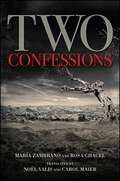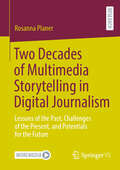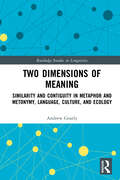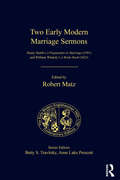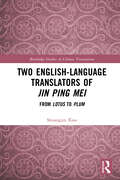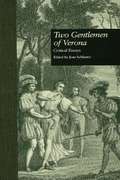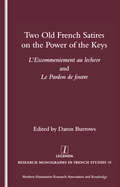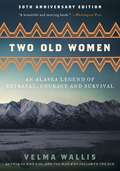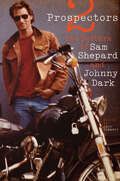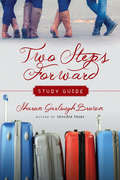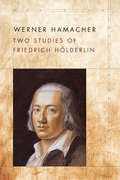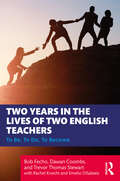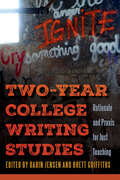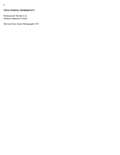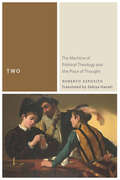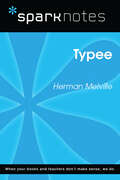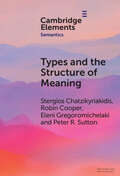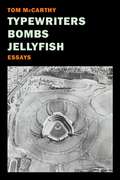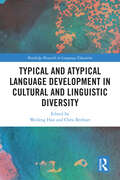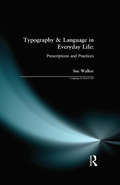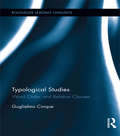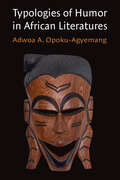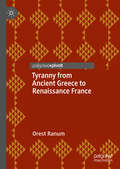- Table View
- List View
Two Confessions (SUNY series in Latin American and Iberian Thought and Culture)
by Rosa Chacel María ZambranoFollowing the defeat of the Second Spanish Republic, María Zambrano (1904–1991) and Rosa Chacel (1898–1994), two of Spain's most gifted intellectuals and writers, wrote compelling meditations on the meaning of confession in life and literature. Noël Valis and Carol Maier provide the first complete English-language translations of these essays. Zambrano and Chacel were friends, if not always amicably so; supporters of the Republic; and exiles. Both disciples of the philosopher Ortega y Gasset, they were nevertheless able to establish their own creative independence in their writing. Not only do the essays address national issues centered on Spanish literature, culture, and history, they also offer a unique philosophical-spiritual and literary approach to confession within the areas of philosophy, literature, religion, autobiography, women's and gender studies, and cultural studies. The translators' introduction, afterword, and meticulous annotations supplement the texts.
Two Cultures?: The Significance of C. P. Snow (Canto Classics)
by Stefan Collini F. R. LeavisIn this first annotated edition of F. R. Leavis's famous critique of C. P. Snow's influential argument about 'the two cultures', Stefan Collini reappraises both its literary tactics and its purpose as cultural criticism. The edition will enable new generations of readers to understand what was at stake in the dispute and to appreciate the enduring relevance of Leavis's attack on the goal of economic growth. In his comprehensive introduction Collini situates Leavis's critique within the wider context of debates about 'modernity' and 'prosperity', not just the 'two cultures' of literature and science. Collini emphasizes the difficulties faced by the cultural critic in challenging widely-held views and offers an illuminating analysis of Leavis's style. The edition provides full notes to references and allusions in Leavis's texts.
Two Decades of Multimedia Storytelling in Digital Journalism: Lessons of the Past, Challenges of the Present, and Potentials for the Future
by Rosanna PlanerLocated within the field of journalism research, this book deals with multimedia storytelling in digital journalism. It focuses on the very fundamental question of how previously established forms of presentation can and have evolved in the digital age. Using a multi-method design, it first conducts a systematic literature analysis of international studies on the selected topic (n=381). Hypotheses derived from this study serve as the basis for a quantitative content analysis of more than 1,700 multimedia stories from German and US media companies, which also forms the core of the analysis. In a final step, the thesis discusses these findings with journalists and story producers from Germany and the USA (n=21). Overall, multimedia stories were produced in a complex and resource-intensive manner just a decade ago, but have since developed into an established and consolidated format in editorial departments. Technological development, the focus on the needs of the audience and the "turn to mobile" are determining the future of the format.
Two Dimensions of Meaning: Similarity and Contiguity in Metaphor and Metonymy, Language, Culture, and Ecology (Routledge Studies in Linguistics)
by Andrew GoatlyThe book takes as its point of departure the notion that similarity and contiguity are fundamental to meaning. It shows how they manifest in oral, literate, print, and internet cultures, in language acquisition, pragmatics, dialogism, classification, the semantics of grammar, literature, and, most centrally, metaphor and metonymy. The book situates these reflections on similarity and contiguity in the interplay of language, cognition, culture, and ideology, and within broader debates around such issues as capitalism, biodiversity, and human control over nature. Positing that while similarity-focused systems can be reductive, and have therefore been contested in social science, philosophy, and poetry, and contiguity-based ones might disregard useful statistical and scientific evidence, Andrew Goatly argues for the need for humans to entertain diverse metaphors, models, and languages as ways of understanding and acting on our world. The volume also considers the cognitive connections between the similarity-contiguity duality and the noun-verb distinction. This innovative volume will appeal to scholars involved in wider debates on meaning, within the fields of cognitive semantics, pragmatics, metaphor and metonymy theory, critical discourse analysis, and the philosophy of language. Equally, the motivated and intelligent general reader, interested in language, philosophy, culture, and ecology, should find the later chapters of the book fascinating, and the earlier technical chapters accessible.
Two Dimensions of Meaning: Similarity and Contiguity in Metaphor and Metonymy, Language, Culture, and Ecology (Routledge Studies in Linguistics)
by Andrew GoatlyThe book takes as its point of departure the notion that similarity and contiguity are fundamental to meaning. It shows how they manifest in oral, literate, print, and internet cultures, in language acquisition, pragmatics, dialogism, classification, the semantics of grammar, literature, and, most centrally, metaphor and metonymy. The book situates these reflections on similarity and contiguity in the interplay of language, cognition, culture, and ideology, and within broader debates around such issues as capitalism, biodiversity, and human control over nature. Positing that while similarity-focused systems can be reductive, and have therefore been contested in social science, philosophy, and poetry, and contiguity-based ones might disregard useful statistical and scientific evidence, Andrew Goatly argues for the need for humans to entertain diverse metaphors, models, and languages as ways of understanding and acting on our world. The volume also considers the cognitive connections between the similarity-contiguity duality and the noun-verb distinction. This innovative volume will appeal to scholars involved in wider debates on meaning, within the fields of cognitive semantics, pragmatics, metaphor and metonymy theory, critical discourse analysis, and the philosophy of language. Equally, the motivated and intelligent general reader, interested in language, philosophy, culture, and ecology, should find the later chapters of the book fascinating, and the earlier technical chapters accessible.
Two Early Modern Marriage Sermons: Henry Smith’s A Preparative to Marriage (1591) and William Whately’s A Bride-Bush (1623) (The Early Modern Englishwoman, 1500-1750: Contemporary Editions)
by Robert MatzThis critical edition of two early modern marriage sermons provides an important resource for students and scholars of early modern literature and history, allowing them to experience firsthand the competing and historically layered ideas about marriage that circulated in the wake of the English Reformation. Read in their entirety these sermons, by turns engaging and infuriating, resist easy characterization. The edition includes an extended critical introduction to the sermons. In the introduction Robert Matz offers evidence for a view of post-Reformation marriage advice that neither overstates nor minimizes historical change. He shows that if some earlier scholars exaggerated the break between Protestant and earlier ideas of marriage, so the criticism of this view has sometimes exaggerated the continuities-especially with regard to writing about marriage. The introduction also provides biblical, theological, political and discursive contexts for the sermons, including the place of the sermon in English early modern print culture, biographies of each of the sermon's authors, and an account of the textual differences among the editions of each sermon. The texts follow the spelling and punctuation of the originals. Annotations are provided to identify references, gloss words with unfamiliar or altered meanings, clarify difficult syntax, and mark variations between editions.
Two English-Language Translators of Jin Ping Mei: From Lotus to Plum (Routledge Studies in Chinese Translation)
by Shuangjin XiaoTwo English-Language Translators of Jin Ping Mei examines English translations of the Ming novel Jin Ping Mei by translators from different historical periods within the Anglophone world.Drawing upon theoretical insights from translation studies, literary criticism, and cultural studies, the book explores the treatment of salient features of the novel in translation, including cultural representation, narratological elements, gender-specific motifs, and (homo)sexual themes. Through literary re-imagining and artistic re-creation, Egerton transforms a complex and sprawling narrative into a popular modern middlebrow novel, making it readily accessible within Western genres. Roy’s interlinear and annotated translation transcends the mere retelling of a vivid story for its unwavering emphasis on every single detail of the original, becoming a portal to the Ming past. It stands as a testament to the significance of translation as a medium for understanding the legacy of the late Ming and the socio-cultural dynamics shaping that period in Chinese history.This book will be a useful reference for scholars and research students within the fields of literary translation studies and translated Chinese literature, particularly Ming- Qing fiction. The book will also appeal to students and researchers studying Jin Ping Mei’s translation and reception in the West.
Two Gentlemen of Verona: Critical Essays (Shakespeare Criticism)
by June SchlueterTwenty-nine collected essays represent a critical history of Shakespeare's play as text and as theater, beginning with Samuel Johnson in 1765, and ending with a review of the Royal Shakespeare Company production in 1991. The criticism centers on three aspects of the play: the love/friendship debate.
Two Old French Satires on the Power of the Keys: L'Escommeniement Au Lecheor and Le Pardon De Foutre
by Daron Burrows"The thirteenth-century French comic dits of Les Escommeniemanz au lecheor and Le Pardon de foutre are two of the earliest vernacular texts to articulate anticlerical satire against the abuse of excommunications and indulgences. In Les Escommeniemanz, a relentless series of excommunications is promulgated against a broad range of social groups accused of activities ranging from the illegal and the immoral, through the socially disruptive, to the profoundly nonsensical and obscene, while in Le Pardon, a cardinal freshly arrived from Rome offers indulgences to groups whose shocking alleged sexual incontinence appears scarcely to merit pardon. Burrows' new edition of two hitherto unedited poems so important to the understanding of lay attitudes towards ecclesiastical authority in thirteenth-century France is complemented by an English translation and a detailed commentary on the texts' literary, linguistic, codicological, ideological, and socio-historical content and context."
Two Old Women
by Velma WallisBased on an Athabascan Indian legend passed along for many generations from mothers to daughters of the upper Yukon River Valley in Alaska, this is the suspenseful, shocking, ultimately inspirational tale of two old women abandoned by their tribe during a brutal winter famine. Though these women have been known to complain more than contribute, they now must either survive on their own or die trying. In simple but vivid detail, Velma Wallis depicts a landscape and way of life that are at once merciless and starkly beautiful. In her old women, she has created two heroines of steely determination whose story of betrayal, friendship, community, and forgiveness "speaks straight to the heart with clarity, sweetness, and wisdom" (Ursula K. Le Guin).
Two Prospectors: The Letters of Sam Shepard and Johnny Dark (Southwestern Writers Collection Series, Wittliff Collections at Texas State University)
by Sam Shepard Johnny DarkThis collection shares decades of correspondence between the Pulitzer Prize-winning playwright and one of his closest friends—including personal photos.One of America&’s leading dramatists, as well as an accomplished actor, screenwriter, and director, Sam Shepard&’s legacy includes immortal plays like True West and Buried Child, as well as memorable film roles, including his Academy Award-nominated performance in The Right Stuff. Though Shepard remained an intensely private man, he wrote candidly about his life and work in letters to his close friend Johnny Dark. His former father-in-law, Dark became a surrogate brother to Shepard, and even an artistic muse. Two Prospectors gathers nearly forty years of correspondence and transcribed conversations between them.In these letters, the men open themselves to each other with gripping honesty. Shepard&’s letters give us the deepest look we will ever get into his personal philosophy and creative process, while in Dark&’s letters we discover insights into Shepard&’s character that only an intimate friend could provide. The writers also reflect on the books and authors that stimulate their thinking, their relationships with women (including Shepard&’s anguished decision to leave his wife and son for actress Jessica Lange), personal struggles, and accumulating years. Illustrated with Dark&’s photographs of Shepard and their mutual family across many years, as well as facsimiles of numerous letters, Two Prospectors is a compelling portrait of a complex friendship that anchored both lives for decades, a friendship also poignantly captured in Treva Wurmfeld&’s film, Shepard & Dark.
Two Steps Forward Study Guide (Sensible Shoes Series)
by Sharon Garlough BrownThe women of Sensible Shoes encounter new adventures and roadblocks in their spiritual journeys in Two Steps Forward. With this study guide, you can explore your own next steps as you dive into the book's spiritual formation themes along with Mara, Meg, Hannah, and Charissa. In this eight-week study guide you'll find daily Scripture readings, reflection questions, and spiritual practices designed to help you be attentive to the invitations of the Holy Spirit. Each week concludes with discussion questions and suggested practices for reading groups to do together. Individually or with a group, you are invited to meet with God and find encouragement for the path ahead.
Two Studies of Friedrich Hölderlin (Meridian: Crossing Aesthetics)
by Werner HamacherTwo Studies of Friedrich Hölderlin shows how the poet enacts a radical theory of meaning that culminates in a unique and still groundbreaking concept of revolution, one that begins with a revolutionary understanding of language. The product of an intense engagement with both Walter Benjamin and Jacques Derrida, the book presents Werner Hamacher's major attempts at developing a critical practice commensurate with the immensity of Hölderlin's late writings. These essays offer an incisive and innovative combination of critical theory and deconstruction while also identifying where influential critics like Heidegger fail to do justice to the poet's astonishing radicality. Readers will not only come away with a new appreciation of Hölderlin's poetic and political-theoretical achievements but will also discover the motivating force behind Hamacher's own achievements as a literary scholar and political theorist. An introduction by Julia Ng and an afterword by Peter Fenves provide further information about these studies and the academic and theoretical context in which they were composed.
Two Years in the Lives of Two English Teachers: To Be, To Do, To Become
by Bob Fecho Dawan Coombs Trevor Thomas Stewart Rachel Knecht Emelio DiSabatoThis book invites readers to explore the complexity of becoming a teacher through the stories of two novice ELA teachers, Emelio and Rachel, over the course of their first two years. The authors’ detailed, empathetic, and ethnographic approach allows space for the teachers to reveal little-seen and often overlooked "wobble moments." These moments illuminate the complexity and nuances that confront, confound, and compel teachers to remain in dialogue with practice. Documenting the journeys of two teachers with compassion and intellectual rigor, this book provides insights into and challenges preconceived notions of what it means to be a teacher. It is essential reading for preservice teachers, scholars, and researchers in English education, as well as individuals considering teaching as a profession.
Two-Year College Writing Studies: Rationale and Praxis for Just Teaching
by Darin Jensen Brett GriffithsTwo-Year College Writing Studies is a comprehensive overview of the two-year college writing teaching experience within our current political and historical contexts, with examples for teachers to better enact just teaching practices in their colleges. Editors Darin Jensen and Brett Griffiths present grounded, well-theorized, and practical strategies for teachers to implement in classrooms, institutions, and geopolitical contexts to advocate more effectively for their students. Contributors draw on theories of identity, rhetorical third space, and linguistics to articulate a praxis of just teaching. They describe existing institutional challenges and opportunities that foster equity and offer cautionary tales of educational systems dismantled for short-term economic and political gains. Two-year college writing studies—when properly resourced—holds the potential to foster (or undermine) democratic ideals of civic literacy and uplift. Chapters in this volume offer case study examples of changes in departmental practices for reflection, interaction, and assessment that empower faculty to break free and engage directly with institutional, regional, state, and national constraints. By making these resilient practices visible, Two-Year College Writing Studies amplifies the voices and validates the experiences of instructors engaging in this work. It will serve generalists, specialists, and academics interested in the subdiscipline of student success pedagogies and the political histories of two-year colleges and be useful for instructors new to the field, as professional development for veteran instructors, and as an introduction for graduate students entering two-year college writing studies programs.
Two-timing Modernity: Homosocial Narrative In Modern Japanese Fiction (Harvard East Asian Monographs #352)
by J. Keith VincentUntil the late nineteenth century, Japan could boast of an elaborate cultural tradition surrounding the love and desire that men felt for other men. By the first years of the twentieth century, however, as heterosexuality became associated with an enlightened modernity, love between men was increasingly branded as “feudal” or immature. The resulting rupture in what has been called the “male homosocial continuum” constitutes one of the most significant markers of Japan’s entrance into modernity. And yet, just as early Japanese modernity often seemed haunted by remnants of the premodern past, the nation’s newly heteronormative culture was unable and perhaps unwilling to expunge completely the recent memory of a male homosocial past now read as perverse.
Two: The Machine of Political Theology and the Place of Thought (Commonalities)
by Roberto EspositoThe debate on “political theology” that ran throughout the twentieth century has reached its end, but the ultimate meaning of the notion continues to evade us. Despite all the attempts to resolve the issue, we still speak its language—we remain in its horizon.The reason for this, says Roberto Esposito, lies in the fact that political theology is neither a concept nor an event; rather, it is the pivot around which the machine of Western civilization has revolved for more than 2,000 years. At its heart stands the juncture between universalism and exclusion, unity and separation: the tendency of the Two to make itself into One by subordinating one part to the domination of the other. All the philosophical and political categories that we use, starting with the Roman and Christian notion of “the person,” continue to reproduce this exclusionary dispositif.To take our departure from political theology, then—the task of contemporary philosophy—we must radically revise our conceptual lexicon. Only when thought has been returned to its rightful “place”—connected to the human species as a whole rather than to individuals—will we be able to escape from the machine that hasimprisoned our lives for far too long.
Typee (SparkNotes Literature Guide Series)
by SparkNotesTypee (SparkNotes Literature Guide) by Herman Melville Making the reading experience fun! Created by Harvard students for students everywhere, SparkNotes is a new breed of study guide: smarter, better, faster. Geared to what today's students need to know, SparkNotes provides: *Chapter-by-chapter analysis *Explanations of key themes, motifs, and symbols *A review quiz and essay topicsLively and accessible, these guides are perfect for late-night studying and writing papers
Types and the Structure of Meaning: Issues in Compositional and Lexical Semantics (Elements in Semantics)
by Peter Sutton Robin Cooper Stergios Chatzikyriakidis Eleni GregoromichelakiAddresses the role of structure in semantic analysis from the perspective of theories of meaning using rich theories of types. Also relates the theory of frames to these type theories as introducing, to some extent, similar structure into semantic analysis. The authors show how a structured approach is necessary to appropriately analyse phenomena in areas as diverse as lexical semantics and the semantics of attitudinal constructions referring to psychological states. In particular, these are: polysemy taken together with copredication, and attitudes such as belief and knowledge. The authors argue that the very same structure required to define a rich system of types enables them to adequately analyse both of these phenomena, thus revealing similarities in two otherwise apparently unrelated topics in semantics. They also argue that such theories facilitate a semantic theory oriented towards a psychological and contextually situated view of meaning. This title is also available as open access on Cambridge Core.
Typewriters, Bombs, Jellyfish: Essays
by Tom MccarthyEssays on literature, pop culture, and more from the cult novelist and critic Tom McCarthyFifteen brilliant essays written over as many years provide a map of the sensibility and critical intelligence of Tom McCarthy, one of the most original and challenging novelists at work today. Typewriters, Bombs, Jellyfish explores a wide range of subjects, from the weather considered as a form of media, to the paintings of Gerhard Richter and the movies of David Lynch, to Patty Hearst as revolutionary sex goddess, to the still-radical implications of established masterpieces such as Ulysses (how do you write after it?), Tristram Shandy, and the unsung junky genius Alexander Trocchi’s darkly beautiful Cain’s Book. The longer “Recessional” examines the place of time in writing—how writing makes a new time of its own, a time apart from institutional time—while the startling “Nothing Will Have Taken Place” moves from Mallarmé and Don DeLillo to the ball mastery of Zidane to look at how art, whether that of a poet, novelist, or athlete, destroys given codes of meaning and behavior, returning them to play. Certain points of reference recur with dreamlike insistence—among them the artist Ed Ruscha’s Royal Road Test, a photographic documentation of the roadside debris of a Royal typewriter hurled from the window of a traveling car; the great blooms of jellyfish that are filling the oceans and gumming up the machinery of commerce and military domination—and the question throughout is: How can art explode the restraining conventions of so-called realism, whether aesthetic or political, to engage in the active reinvention of the world?
Typical and Atypical Language Development in Cultural and Linguistic Diversity (Routledge Research in Language Education)
by Weifeng Han and Chris BrebnerTypical and Atypical Language Development in Cultural and Linguistic Diversity brings together state-of-the-art studies in both typical and atypical language development. Placing the topic in the context of cultural and linguistic diversity (CALD), the book offers readers serious theoretical consideration of the topic and provides implications for multilingual educational and clinical practices. The content covers a wide range of topics related to multilingual language development in CALD: typical and atypical language development in CALD, and the interface between both; the relationship between multilingual competence and academic performance in CALD; providing unbiased speech and language measures in CALD; and heritage and minority languages education in CALD. Each chapter outlines the core theoretical and practical issues and explores both theoretical and pedagogical/clinical implications in the area and possible future developments. This volume is an essential resource for all those who study, research, or are interested in multilingual development, educational linguistics, and clinical linguistics in the CALD context.
Typography & Language in Everyday Life: Prescriptions and Practices (Language In Social Life)
by Sue WalkerTypography and Language in Everyday Life provides a detailed look at graphic as well as linguistic aspects of language and suggests there is much to be gained from collaboration between typographers and applied linguists.The first part of the book provides an introduction to aspects of typographic theory and history and suggests some areas of applied linguistics that offer approaches to studying graphic language. The second part comprises case studies which look at the relationship between prescription and practice for visual organisation by considering everyday display typography, house style and typing manuals, and letter-writing. Each of these subjects is looked at from historical and theoretical perspectives.Aimed at those who may be unfamiliar with theoretical and historical perspectives on the graphic aspects of language, and with broad concepts in applied linguistics, the book also directs readers to areas of further reading in each of these fields. Extensively illustrated with examples of past and present graphic language, Typography and Language in Everyday Life is essential reading for students of typography, graphic design, applied linguistics and education, as well as the general reader.
Typological Studies: Word Order and Relative Clauses (Routledge Leading Linguists #16)
by Guglielmo CinqueIn this book, Cinque takes a generative perspective on typological questions relating to word order and to the syntax of relative clauses. In particular, Cinque looks at: the position of the Head vis à vis the relative clause in relation to the position of the verb vis à vis his object; a general cross-linguistic analysis of correlatives; the need to distinguish a sentence-grammar, from a discourse-grammar, type of non-restrictives (with languages differing as to whether they possess both, one, the other, or neither); a selective type of extraction from relative clauses; and a tentative sketch of a more ample work in progress on a unified analysis of externally headed, internally headed, and headless relative clauses.
Typologies of Humor in African Literatures (African Perspectives)
by Adwoa A Opoku-AgyemangTypologies of Humor in African Literatures is a study on the use of humor and comedy in African literary texts across the twentieth century. Despite humor being omnipresent in African societies and their literatures, discussions of contemporary African literature have largely dismissed it as being too lighthearted compared to the more serious issues of post-colonial history, class inequality, and politics. Adwoa A. Opoku-Agyemang, while acknowledging the seriousness of the subject matter, establishes humor as an essential component of African fiction. The book analyzes four comedic archetypes: the Trickster, who is unapologetically amoral and entertaining; the Mimic, whose everyday dealings exude ambiguity; the Interpreter, who demonstrates the comic potential of language differences while showing how a single message can mean contrasting things; and the Deviant, who throws norms into question all the while reinforcing them. These character types and the humor they produce present a constant pursuit of balance between contrasting worldviews and frames of reference within the imbrication of different languages, classes, political factions, genders, and (un)officialdoms. The product of these rowdy relations are people who take the weirdness and run with it to generate diegetic and intradiegetic laughs. By analyzing Francophone and Anglophone African writing and how it overlays local languages, Opoku-Agyemang contributes a uniquely African voice to the primarily Western-dominated field of humor studies.
Tyranny from Ancient Greece to Renaissance France
by Orest RanumThis Palgrave Pivot examines how prominent thinkers throughout history, from ancient Greece to sixteenth-century France, have perceived tyrants and tyranny. Ancient philosophers such as Plato and Aristotle were the first to build a vocabulary for tyrants and the forms of government they corrupted. Thirteenth century analyses of tyranny by Thomas Aquinas and John of Salisbury, revived from Antiquity, were recast as short observations about what tyrants do. They claimed that tyrants govern for their own advantage, not for the people. Tyrants could be usurpers, increase taxes, and live in luxury. The list of tyrannical actions grew over time, especially in periods of turmoil and civil war, often raising the question: When can a tyrant be legitimately deposed or killed? In offering a brief biography of these political philosophers, including Machiavelli, Erasmus, More, Bodin, and others, along with their views on tyrannical behavior, Orest Ranum reveals how the concept of tyranny has been shaped over time, and how it still persists in political thought to this day.
